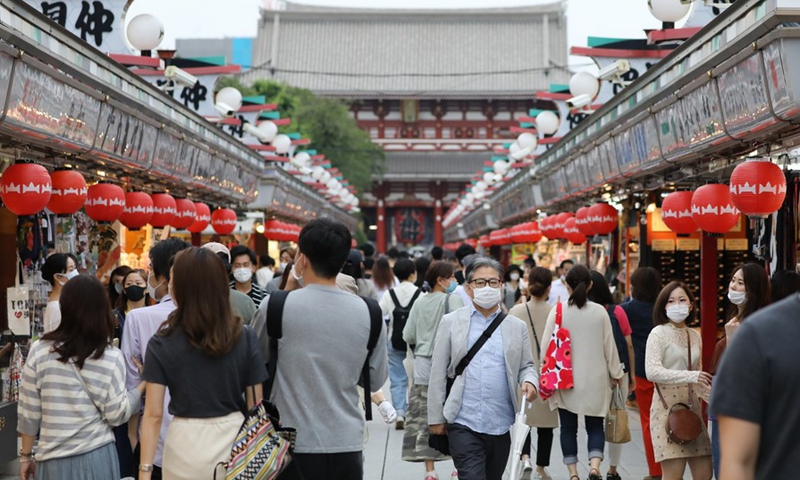Surge in new cases in Tokyo doesn't mean Japan's anti-pandemic measures have failed: expert
By Sun Haoran Source: Globaltimes.cn Published: 2020/7/13 1:07:51

Visitors are seen at the sightseeing spot Asakusa, in Tokyo, Japan, June 21, 2020. Photo: Xinhua
Chinese experts said that the recent spike in new coronavirus infections in Tokyo doesn't mean the Japanese government's anti-pandemic measures have been ineffective but are a result of trying to balance tackling COVID-19, opening the economy and maintaining social stability.
Tokyo reported 206 new coronavirus infections on Saturday, topping the 200 mark for the third straight day, an official said. The cases in Tokyo account for more than half of the 383 new cases across Japan, Kyoto News reported on Saturday.
Although Saturday's tally in the capital is down from the record of 243 set Friday, the number of cases have exceeded 200 three days in a row for the first time, fueling concerns of a second wave of infections, Kyoto News said.
Despite the alarming trend, Japan relaxed its guidelines Friday on holding large sporting and other events, and the top government spokesperson suggested the government will not ask people to stay at home again to curb the virus spread.
Some observers said that the Japanese government hasn't effectively contained the COVID-19 pandemic, and it's too early to end the state of emergency, as many of the cases are with unknown infection sources.
However, Geng Xin, a TV commentator based in Hong Kong who has also lived in Japan some 30 years, told the Global Times on Sunday that although there have been new coronavirus cases in Japan recently, it doesn't mean that Japanese government's anti-pandemic measures have been ill prepared or not thorough enough.
"Japan is trying to carry out operations that can best maintain the balance between tackling COVID-19, economic development and maintaining social stability," said Geng.
Liu Junhong, a research fellow at the China Institutes of Contemporary International Relations, told the Global Times on Sunday that economic development is crucial to Japan. "The goal of the Japanese government is to minimize the pandemic's impact on its economy while keeping the coronavirus under control."
Li said Prime Minister Shinzo Abe's administration has implemented a state of emergency, which is less strict than a lockdown and more like a request or instruction to guide the Japanese people amid the outbreak, Liu noted.
According to Kyoto News, Tokyo recorded 7,721 COVID-19 cases, about a third of the 21,526 confirmed cases with 996 deaths in Japan as of Saturday. Of the 206 new infections in the capital, none of them have developed severe symptoms, and 101 have no known source of infection, according to the metropolitan government.
By age group, 159 are in their 30s or younger, accounting for around 80 percent of the new infections. Forty-eight infections were related to nightlife establishments such as host clubs, and 59 people were infected at their workplace, or from family members or dining out, according to the Tokyo government.
"The recent spike is because young people are less concerned about the epidemic and many of them are asymptomatic or have shown mild symptoms," said Geng.
Japan has been able to maintain a relatively low infection level due to its developed medical and healthcare system and Japanese people's good health habits, he added.
Posted in: ASIA-PACIFIC